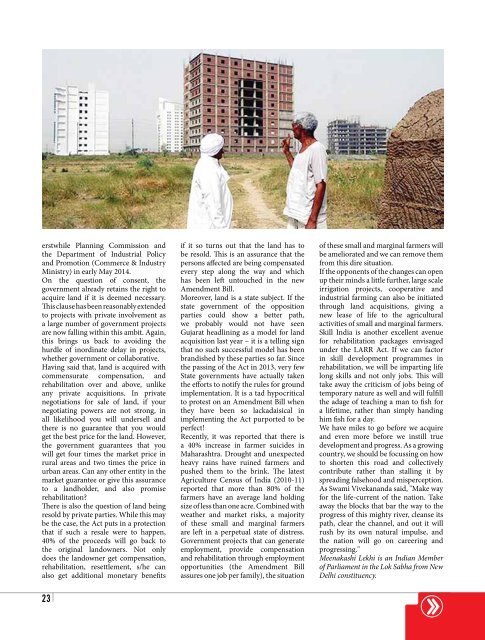MAY 2015
Create successful ePaper yourself
Turn your PDF publications into a flip-book with our unique Google optimized e-Paper software.
erstwhile Planning Commission and<br />
the Department of Industrial Policy<br />
and Promotion (Commerce & Industry<br />
Ministry) in early May 2014.<br />
On the question of consent, the<br />
government already retains the right to<br />
acquire land if it is deemed necessary.<br />
This clause has been reasonably extended<br />
to projects with private involvement as<br />
a large number of government projects<br />
are now falling within this ambit. Again,<br />
this brings us back to avoiding the<br />
hurdle of inordinate delay in projects,<br />
whether government or collaborative.<br />
Having said that, land is acquired with<br />
commensurate compensation, and<br />
rehabilitation over and above, unlike<br />
any private acquisitions. In private<br />
negotiations for sale of land, if your<br />
negotiating powers are not strong, in<br />
all likelihood you will undersell and<br />
there is no guarantee that you would<br />
get the best price for the land. However,<br />
the government guarantees that you<br />
will get four times the market price in<br />
rural areas and two times the price in<br />
urban areas. Can any other entity in the<br />
market guarantee or give this assurance<br />
to a landholder, and also promise<br />
rehabilitation?<br />
There is also the question of land being<br />
resold by private parties. While this may<br />
be the case, the Act puts in a protection<br />
that if such a resale were to happen,<br />
40% of the proceeds will go back to<br />
the original landowners. Not only<br />
does the landowner get compensation,<br />
rehabilitation, resettlement, s/he can<br />
also get additional monetary benefits<br />
23<br />
if it so turns out that the land has to<br />
be resold. This is an assurance that the<br />
persons affected are being compensated<br />
every step along the way and which<br />
has been left untouched in the new<br />
Amendment Bill.<br />
Moreover, land is a state subject. If the<br />
state government of the opposition<br />
parties could show a better path,<br />
we probably would not have seen<br />
Gujarat headlining as a model for land<br />
acquisition last year – it is a telling sign<br />
that no such successful model has been<br />
brandished by these parties so far. Since<br />
the passing of the Act in 2013, very few<br />
State governments have actually taken<br />
the efforts to notify the rules for ground<br />
implementation. It is a tad hypocritical<br />
to protest on an Amendment Bill when<br />
they have been so lackadaisical in<br />
implementing the Act purported to be<br />
perfect!<br />
Recently, it was reported that there is<br />
a 40% increase in farmer suicides in<br />
Maharashtra. Drought and unexpected<br />
heavy rains have ruined farmers and<br />
pushed them to the brink. The latest<br />
Agriculture Census of India (2010-11)<br />
reported that more than 80% of the<br />
farmers have an average land holding<br />
size of less than one acre. Combined with<br />
weather and market risks, a majority<br />
of these small and marginal farmers<br />
are left in a perpetual state of distress.<br />
Government projects that can generate<br />
employment, provide compensation<br />
and rehabilitation through employment<br />
opportunities (the Amendment Bill<br />
assures one job per family), the situation<br />
of these small and marginal farmers will<br />
be ameliorated and we can remove them<br />
from this dire situation.<br />
If the opponents of the changes can open<br />
up their minds a little further, large scale<br />
irrigation projects, cooperative and<br />
industrial farming can also be initiated<br />
through land acquisitions, giving a<br />
new lease of life to the agricultural<br />
activities of small and marginal farmers.<br />
Skill India is another excellent avenue<br />
for rehabilitation packages envisaged<br />
under the LARR Act. If we can factor<br />
in skill development programmes in<br />
rehabilitation, we will be imparting life<br />
long skills and not only jobs. This will<br />
take away the criticism of jobs being of<br />
temporary nature as well and will fulfill<br />
the adage of teaching a man to fish for<br />
a lifetime, rather than simply handing<br />
him fish for a day.<br />
We have miles to go before we acquire<br />
and even more before we instill true<br />
development and progress. As a growing<br />
country, we should be focussing on how<br />
to shorten this road and collectively<br />
contribute rather than stalling it by<br />
spreading falsehood and misperception.<br />
As Swami Vivekananda said, "Make way<br />
for the life-current of the nation. Take<br />
away the blocks that bar the way to the<br />
progress of this mighty river, cleanse its<br />
path, clear the channel, and out it will<br />
rush by its own natural impulse, and<br />
the nation will go on careering and<br />
progressing."<br />
Meenakashi Lekhi is an Indian Member<br />
of Parliament in the Lok Sabha from New<br />
Delhi constituency.
















